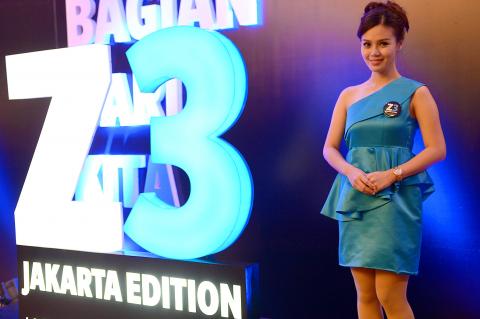BlackBerry Ltd launched a low-cost touch screen device in Jakarta, the Z3, as the embattled smartphone maker looks to revive sales in emerging markets like Indonesia, where its once-fervent following has shriveled.
The handset, unveiled at a glitzy launch event in the Indonesian capital on Tuesday, is the first in a line of devices being made with FIH Mobile Ltd (富智康), a unit of the giant Foxconn Technology Group (富士康科技集團) best known for assembling gadgets like iPhones and iPads for Apple Inc.
The success of the handset retailing for less than US$200 could well decide the outcome of both BlackBerry’s tie-up with the contract manufacturing giant and its own future in smartphones.

Photo: AFP
The Z3 Jakarta Edition will hit store shelves tomorrow. It is the first phone to be launched by BlackBerry since new chief executive John Chen (程守宗) took the helm late last year.
It is initially being launched in Indonesia, but will be gradually introduced in other markets as well.
Waterloo, Ontario-based BlackBerry hopes that the device and others to follow will help it claw back some of the collapse in its market share, ceded to Apple’s iPhone and Samsung Electronics Co’s line of Galaxy devices powered by Google Inc’s Android operating system.
“If the market doesn’t receive this product well, then we definitely have some negative issues to deal with,” Chen said at the launch at Jakarta’s Ritz-Carlton hotel.
Just two years ago, the Canadian firm had a 40 percent share of the Indonesian market, shipping more than 600,000 handsets per quarter in a country once known as “BlackBerry Nation.”
The launch of the premium, high-priced BlackBerry 10 last year failed to attract buyers in a country where nearly 40 percent of the population live on about US$2 a day. Indonesia is now dominated by Samsung, which sells about one of every three smartphones in Southeast Asia’s largest economy.
Chen hopes that the Z3 and other devices to follow spark a change in the company’s fortunes. The Z3 is being launched at a price point below US$200 to address one of the big turnoffs for consumers in emerging markets — BlackBerry 10 devices being too pricey.
“From conception to delivery, the BlackBerry Z3 Jakarta Edition was designed specifically with Indonesian customers in mind,” Chen said in a statement.
The device will allow users to type in Bahasa and come with a special set of BlackBerry Messenger, or BBM Stickers featuring local characters.
Later this year, BlackBerry will launch a new, non-touchscreen device dubbed the BlackBerry Classic in partnership with Foxconn. The handset will see a return of the command keys that include “Menu,” “Back,” “Send” and “End” buttons, along with a trackpad. BlackBerry hopes the move will address the concerns of those users who found their new devices hard to navigate.
For Foxconn, the tie-up fits with plans to set up a manufacturing plant in Indonesia to build smartphones and other electronic devices. The Taiwanese company’s ambitions have been on hold for years due to drawn-out talks over tax breaks, property and import restrictions.

SEEKING CLARITY: Washington should not adopt measures that create uncertainties for ‘existing semiconductor investments,’ TSMC said referring to its US$165 billion in the US Taiwan Semiconductor Manufacturing Co (TSMC, 台積電) told the US that any future tariffs on Taiwanese semiconductors could reduce demand for chips and derail its pledge to increase its investment in Arizona. “New import restrictions could jeopardize current US leadership in the competitive technology industry and create uncertainties for many committed semiconductor capital projects in the US, including TSMC Arizona’s significant investment plan in Phoenix,” the chipmaker wrote in a letter to the US Department of Commerce. TSMC issued the warning in response to a solicitation for comments by the department on a possible tariff on semiconductor imports by US President Donald Trump’s

The government has launched a three-pronged strategy to attract local and international talent, aiming to position Taiwan as a new global hub following Nvidia Corp’s announcement that it has chosen Taipei as the site of its Taiwan headquarters. Nvidia cofounder and CEO Jensen Huang (黃仁勳) on Monday last week announced during his keynote speech at the Computex trade show in Taipei that the Nvidia Constellation, the company’s planned Taiwan headquarters, would be located in the Beitou-Shilin Technology Park (北投士林科技園區) in Taipei. Huang’s decision to establish a base in Taiwan is “primarily due to Taiwan’s talent pool and its strength in the semiconductor

An earnings report from semiconductor giant and artificial intelligence (AI) bellwether Nvidia Corp takes center stage for Wall Street this week, as stocks hit a speed bump of worries over US federal deficits driving up Treasury yields. US equities pulled back last week after a torrid rally, as investors turned their attention to tax and spending legislation poised to swell the US government’s US$36 trillion in debt. Long-dated US Treasury yields rose amid the fiscal worries, with the 30-year yield topping 5 percent and hitting its highest level since late 2023. Stocks were dealt another blow on Friday when US President Donald

UNCERTAINTY: Investors remain worried that trade negotiations with Washington could go poorly, given Trump’s inconsistency on tariffs in his second term, experts said The consumer confidence index this month fell for a ninth consecutive month to its lowest level in 13 months, as global trade uncertainties and tariff risks cloud Taiwan’s economic outlook, a survey released yesterday by National Central University found. The biggest decline came from the timing for stock investments, which plunged 11.82 points to 26.82, underscoring bleak investor confidence, it said. “Although the TAIEX reclaimed the 21,000-point mark after the US and China agreed to bury the hatchet for 90 days, investors remain worried that the situation would turn sour later,” said Dachrahn Wu (吳大任), director of the university’s Research Center for